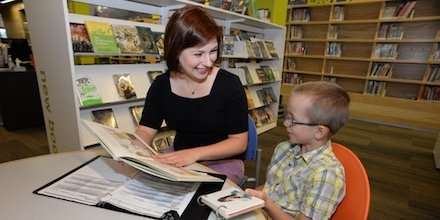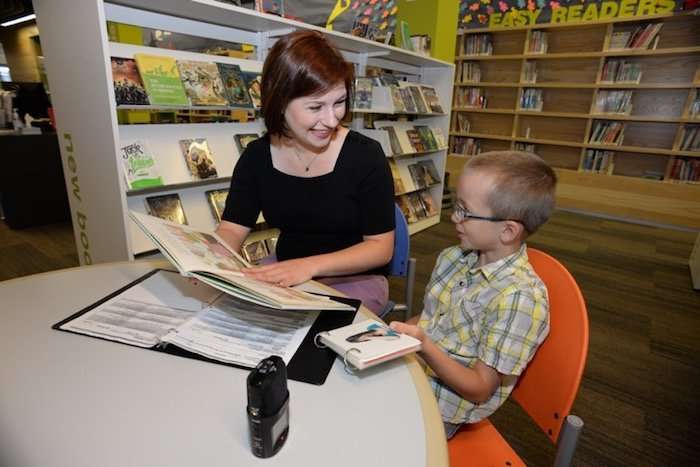Research hones interventions for kids with developmental language disorder

In an average kindergarten class of 30 students, about two are experiencing developmental language disorder, meaning they learn language more slowly than their peers. While DLD is just as common as dyslexia or ADHD, fewer people have heard of the disorder, and less research and funding go into developing effective interventions.
"I think it's hidden," said Holly Storkel, professor of speech-language-hearing and director of the Word & Sound Learning Lab at the University of Kansas. "People don't necessarily recognize when children are having problems with language. These are kids who talk—so if you ask a parent, they might not realize we're looking for something subtler. Children with DLD won't use specific words as often. They might say 'put the thing over here' or use gestures. A parent will understand what the child wants to happen—but the child isn't using specific, sophisticated language consistent with their age. You need a pretty good ear for what kids do at that age to pick up on their challenges."
Storkel leads a research project aimed at developing effective interventions for kids with DLD called KAW Story. The project just earned a $1.5 million grant from the National Institute on Deafness and Other Communication Disorders to continue research with 60 Kansas kindergarteners across several school districts.
Building on results from an earlier grant, the KAW Story project will use one-on-one book reading to expose children with DLD to new words and test the kids' ability to retain new vocabulary in order to improve the teaching techniques.
"The point of the grant is to use book reading as a way of teaching children with DLD new words," said Storkel, who also serves as associate dean for academic innovation and student success at KU's College of Liberal Arts & Sciences. "In the first grant, we were trying to figure out the basic structure of the book reading—what we know about book reading already is if you read the book cover-to-cover, that's not as good as if you read the book and pause and talk about the book while you're reading. When you pause it's important to intentionally teach the words to help the child learn the word—maybe explain the word or relate it to something that happened recently."
"What was successful from the first grant was that children learned pretty well during treatment with book reading, but the challenge was once we stopped and checked if they were remembering the words, some weren't remembering them well," she said.
Beyond reading, the KU researcher said the new grant would focus on testing kids' ability to understand and retain new words to determine if that would improve memory of the words.
"Testing has powerful effects on learning and remembering," said Storkel. "The idea is you're practicing what you need to do to use the word. That's an important part of memory, of calling up information you need. We want to find out how much testing kids need. We don't think children we're working with enjoy testing—I mean, who does? —this already is hard for them, and testing will make it harder. We want to find an amount of testing that might be optimal for them—an amount of testing that helps them learn but not so much that it makes them dread the activity." According to Storkel, other aims of the new grant work will address a finding that all children in the previous study did not benefit equally from interactive book reading.

"Not all children learned words well within the treatment—some children, a small minority, didn't learn at all," she said. "There was another group that learned an average number of words and another group that was outstanding. It's certainly true that even with typically developing kids there's a wide range of performance. In groups with communication disorders, we see a wider range."
Under the new award, Storkel and her team will identify pre-treatment characteristics of children with DLD associated with how quickly they learn words during treatment or how slowly they forget words after treatment. Moreover, they'll select a pre-treatment set of tests to sample a wide array of skills likely to be associated with learning in the moment or forgetting over time.
After treatment, the KU team will classify each child's response and compare it with earlier performance to determine when treatment and post-treatment outcomes can be predicted.
A team of KU graduate-student researchers will carry out the majority of evaluations, book-reading sessions and tests at schools in Kansas. Some of the sites are in rural areas surrounding KU, such as Oskaloosa, Overbrook and Basehor. The graduate students gain required research experience and earn salaries that help fund their studies.
"It's mostly Ph.D. students or master's students in speech-language-hearing who as graduate research assistants are paid from the grant to drive to the schools in these far-reaching areas," Storkel said.
But the ultimate beneficiaries of the new grant will be the students experiencing DLD, who without effective intervention face greater educational and professional challenges than many of their peers.
"Some of the long-term follow-up studies show children with DLD can struggle academically," said Storkel. "Fewer go to college. They tend to have less-skilled, less high-paying jobs as a group. Of course, there are individual stories of great success. But as a group they have poorer outcomes in education and employment."
If parents suspect their child may be experiencing DLD, Storkel said states provide evaluation services.
"People can get free testing of kids from a variety of services depending on their age," she said. "In Kansas we have Tiny K. All states have these services for children up to age three—you call in and say you have a concern, and they listen to your concerns and send out a professional to your home to do an evaluation. Once kids are preschool age, they can be served by their local elementary school. Early on in development, you see a lot of variation in language learning, so it makes it difficult to determine if your particular child has an issue or not. The formal evaluation really helps there."





















